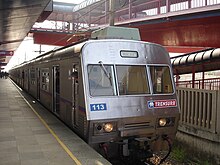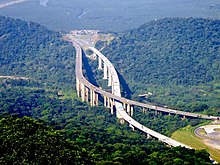Transport in Brazil
This article may require cleanup to meet Wikipedia's quality standards. The specific problem is: Unchecked vandalism may have compromised this article – need to check the statements and links to verify that they're not bogus. (October 2016) (Learn how and when to remove this template message) |
Transport infrastructure in Brazil is characterized by strong regional differences and lack of development of the national rail network.[1] Brazil's fast-growing economy, and especially the growth in exports, will place increasing demands on the transport networks.[2] However, sizeable new investments that are expected to address some of the issues are either planned or in progress.[2][3]
Railways[edit]
- Total actual network: 29,303 km
- Broad gauge: 4,932 km 1,600 mm (5 ft 3 in) gauge (939 km electrified)
- Narrow gauge: 23,773 km 1,000 mm (3 ft 3 3⁄8 in) gauge (581 km electrified)
- Dual gauge: 396 km 1000 mm and 1600 mm gauges (three rails)
- Standard gauge: 202.4 km 1,435 mm (4 ft 8 1⁄2 in) gauge (2006)
- Estrada de Ferro do Amapá in the middle of the Amazon Rainforest also used standard gauge.
- A 12 km section of the former 2 ft 6 in (762 mm) gauge Estrada de Ferro Oeste de Minas is retained as a heritage railway.
Cities with metros[edit]
|
|
Railway links with adjacent countries[edit]
International rail links exist between Brazil and Argentina, Bolivia and Uruguay.
Tramways[edit]
Brazil had a hundred tramway systems.[4] Currently, there are vintage tramways operating in Belém,[5] Campinas,[6] Campos do Jordão,[7] Itatinga,[8] Rio de Janeiro[9] and Santos.[10]
Highways[edit]

Brazil has 1,751,868 kilometers of roads, 96,353 km of them paved and 1,655,515 km unpaved. That means that only 5.5% of the roads are paved and that 94.5% are unpaved. The most important highway of the country is BR-116 and the second is BR-101.
The country has a low rate of car ownership of 140 per 1000 people, however in comparison to the other developing economies of the BRIC group Brazil exceeds India and China.
Waterways[edit]
50,000 km navigable (most in areas remote from industry or population) (2008)
Pipelines[edit]
- condensate/gas 62 km
- natural gas 9,892 km
- liquid petroleum gas 353 km
- crude oil 4,517 km
- refined products 4,465 km (2008)
Seaports and harbors[edit]
Atlantic Ocean[edit]
Amazon river[edit]
Paraguay River (international water way)[edit]
Merchant marine[edit]
total: 136 ships (1,000 gross tonnage (GT) or over) totaling 3,964,808 GT/6,403,284 tonnes deadweight (DWT)
ships by type: (1999 est.)
|
Airports[edit]
Most international flights must go to São Paulo–Guarulhos International Airport or Rio de Janeiro–Galeão International Airport. Belo Horizonte is the main international airport outside Rio de Janeiro and São Paulo. A few go to Brasília, Recife, Natal, and just recently Fortaleza has accepted international flights. With South American integration, more airports can be expected to open to international flights.
In 2013 Brazil had the sixth largest passenger air market in the world.[11]
Airports - with paved runways[edit]
- total: 734
- over 3,047 m: 7
- 2,438 to 3,047 m: 26
- 1,524 to 2,437 m: 169
- 914 to 1,523 m: 476
- under 914 m: 56 (2008)
Airports - with unpaved runways[edit]
- total: 3,442
- 1,524 to 2,437 m: 85
- 914 to 1,523 m: 1,541
- under 914 m: 1,816 (2008)
National airlines[edit]
- Azul Linhas Aéreas Brasileiras
- Gol Transportes Aéreos
- Avianca
- TAM Airlines (TAM Linhas Aéreas)
Heliports[edit]
- 16 (2007)
- 13 (2010)
See also[edit]
References[edit]
- ^ "Logistics in Brazil - DHL Logistik". Archived from the original on 2012-07-24.
- ^ a b "Archived copy" (PDF). Archived from the original (PDF) on 2012-09-22. Retrieved 2012-09-22.CS1 maint: archived copy as title (link)
- ^ Home page | The world's leading construction web site[permanent dead link]
- ^ "INTRODUCTION". www.tramz.com.
- ^ "The Tramways of Belém". www.tramz.com.
- ^ "The Tramways of Campinas". www.tramz.com.
- ^ "Campos do Jordão". www.tramz.com.
- ^ "CODESP hydroelectric complex (Brazil)". www.tramz.com.
- ^ "THE SANTA TERESA TRAMWAY". www.tramz.com.
- ^ "THE SCOTTISH TRAMS OF SANTOS". www.tramz.com.
- ^ World Bank Datebase, http://data.worldbank.org/indicator/IS.AIR.PSGR
External links[edit]
| Wikimedia Commons has media related to Transport in Brazil. |






No comments:
Post a Comment